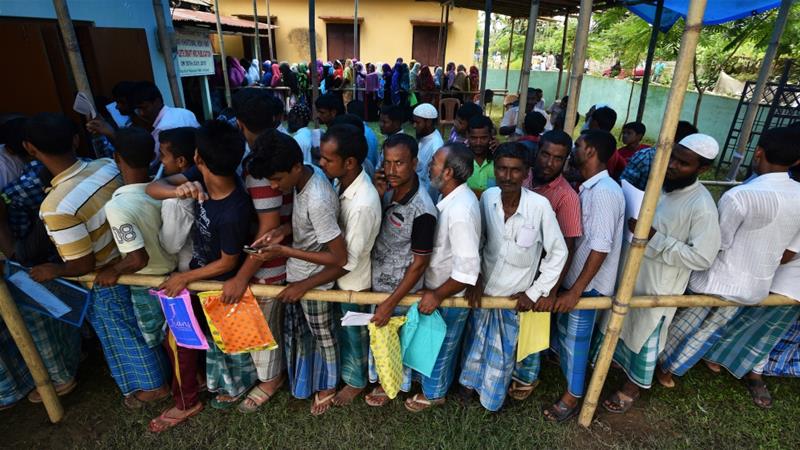The recent exercise of updating the National Register of Citizens in Assam left 40 lakh people in a state of limbo, with many organisations including Amnesty International concerned about the citizenship status of these so-called illegal immigrants. While people are being whittled down to numbers and their lives being reduced to mere passport-sized photos in a form, a section of the Bengali Muslim youth in Assam are developing a unique brand of poetry to relay their experiences.
The Bengal-origin Muslim people of Assam have long been termed “Miyah”, a slur that is actually a misnomer for the same Urdu word that refers to an elderly gentleman. While the term itself has been in use for a long time, it has slowly morphed into a ‘dirty’ word.

Shalim Hussein, the founder of Itamugur and a Miyah poet. Credit: Facebook
The history of Bengali ‘immigration’ into Assam and its neighbouring areas is a long, protracted one. First, as a colonial project to populate the valleys of Assam with cheap labour for growing cash crops like jute after the Burmese invasion (1817-1826), and then as part of the Sayed Mohammad Sadullah government’s “Grow More Food” campaign in the 1930s. Immigrants trickled into Assam as a part of such government projects to resettle people. This was not a one-way process; even today, there are Garo people inhabiting the Mymensingh district of Bangladesh, so clearly this movement of people went both ways.
Nevertheless, symbols such as the skull-cap, a blue gingham lungi, a beard, dark skin, the Bengali language— have all turned into triggers that invite vilification, marginalisation, contestation and subsequently, oppression. Citizenship – and therefore, legal existence – becomes a battle played out in terms of religion and language. So, the NRC exercise should not be seen in isolation, but rather as a part of a discourse that feeds on collective fears of the majorities and the minorities of the state, what Foucault would have called building a “regime of truth”. Interestingly, the new Miyah poets in Assam are reclaiming such symbols as part of a new kind of alternative subversive discourse.
The Miyah poets are a part of a social media movement they have termed ‘Itamugur’ on their Facebook page (literally, Itamugur refers to a mallet to break clods of earth, a metaphor for the pounding sounds of protest poetry). Shalim M. Hussain, a research scholar at Jamia Milia Islamia, the page’s founder, wrote a poem called ‘Nana I have written’ in response to another poem by a Miyah activist called Hafiz Ahmed called ‘Write down I am a Miya’. The two poems’ popularity on social media inspired others to write about their own experiences in the state, snowballing into a movement.
Since then, Itamugur has grown from a small Facebook page in 2016 to being significant enough to be featured in Al-Jazeera and other publications. Hussain is now actively involved in helping translate many such poems into English.
The poetry of Itamugur is thought-provoking, rebellious and occasionally dark. It borrows from a long tradition of Bengali writers who wrote both in Bengali and Assamese, the latter including Kasema Khatoon and Ilimuddin Dewan. It sometimes invokes periods of particular difficulty in the lives of the Bengali-speaking Muslims of the state. In a poem by Abdur Rahim, the following lines reverberate:
Look no more on my sun burnt back
For barb wire scratches
But please,
Please don’t forget ’83, ’94, ’12, ’14.
Please don’t call my burns
The scratch marks of barbed wires anymore.
While some of the poems speak of deep distrust and suspicion against the state, others reflect the tension between the oppressed who have deferred their dreams and those that still aspire to something big, albeit within their narrow spaces for self-expression and freedom. For instance, Hussain writes in ‘Nana I have written’:
Visit me in Kolkatta in Nagpur in the Seemapuri slums
See me suited in Silicon Valley suited at McDonalds
Enslaved in Beerwa bride-trafficked in Mewat
See the stains on my childhood
The gold medals on my PhD certificate
Then call me Salma call me Aman call me Abdul call me Bahaton Nessa
Or call me Gulam.
See me catch a plane get a Visa catch a bullet train
Catch a bullet
Catch your drift
Catch a rocket
Wear a lungi to space
And there where no one can hear you scream,
Thunder
I am Miyah
I am Proud.
Ultimately, poetry remains an effective form of subversion, a kind of internal catharsis against communal politics. When asked about the future of Itamugur, Hussain ends on a hopeful note, “The future of Itamugur is to celebrate ourselves… at some point, there will be a shift in tone towards joy, even if it’s the joy of survival. But it might take some time.” One can only hope that recent reports of water-boarding and the arrests that lead to lives spent in mysterious detention camps, do not dampen his spirits.
Sara Sohail is a student at Miranda House, Delhi University.

